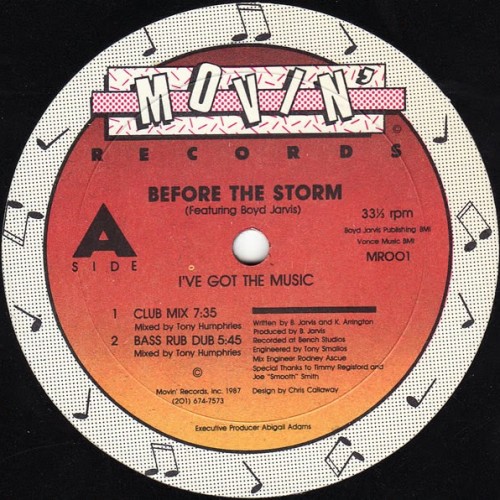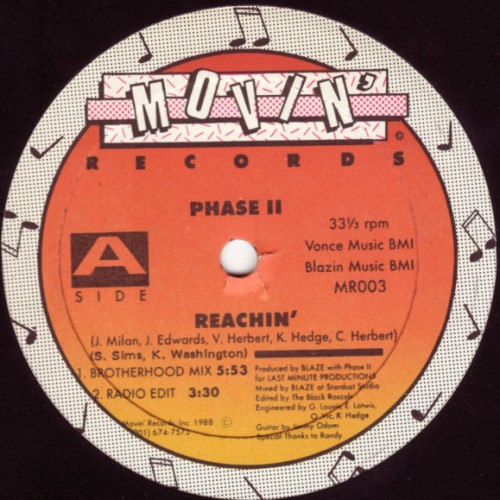We Learn Dances: Interview with Abigail Adams of Movin’ Records
Strictly Rhythm. Nervous. Emotive. These seminal New York labels, along with a handful of others, evoke a time in the late ’80s and early ’90s when the local variant of house music, one that combined depth, emotion and soul with the raw rhythms that had been coming out of Chicago, took form. But there was one other local label that was equally influential—and it wasn’t even based within the five boroughs. Its name was Movin’ Records, a label (and record shop) led by Abigail Adams and based in East Orange, New Jersey.
Between 1987 and 1995, Movin’ released some of the most beloved songs of the era—Phase II’s stone-cold classic “Reachin’” among them—and its lineup of vocalists and producers and included such notables as Kerri Chandler, Kenny Bobien, DJ Pierre, Ce Ce Rogers, Blaze’s Kevin Hedge and Josh Milan, Ace Mungin and Tony Humphries. That last name is key: A symbiotic relationship formed between the club that Humphries deejayed at, Club Zanzibar in nearby Newark, and Movin.’ Though they were both just a few miles west of Manhattan, the Movin’-Zanzibar affiliation resulted in a sound with a different feel than what was going down in Gotham, a feel that amped up the gospel- and R&B–tinged passion beyond what the big city had to offer. It’s a style of house generally referred to as the Jersey Sound—and its effects can still be felt on the club music of today. I recently had the pleasure of speaking with the gracious and friendly Adams, her love of the music still shining brightly.—Bruce Tantum
How did Movin’ Records get started?
Abigail Adams: Movin’ was an interesting journey. I never had the intention of doing a record shop or a record label. It actually started as a roller-skating store. I used to go to the Roxy in Manhattan and roller skate. I loved it, but I couldn’t find a place in New Jersey to buy skates, so I opened Movin’ Skates in the early ’80s. We built custom skates and did skate rentals. My partner and boyfriend at the time was a DJ, and he had some 1200s in the back of the shop. We were also going to the Paradise Garage, so we were pretty up on the sound, and we used to go into the city—to places like Downstairs, Downtown, Vinylmania, Rock & Soul—to buy records and play at the shop. People would ask, “Oh wow, what’s that cut?” I’d say, “Oh, I can get it for you!” So I would literally just buy it from Charlie Grappone at Vinylmania or whoever, bring it back to Jersey and sell it for a quarter or fifty cents more.
And it just progressed from there?
Abigail Adams: Yeah. More and more people started asking for records, so I started buying direct. My network started opening up. I knew people like Judy Weinstein and David Morales and all the people at [record pool] For the Record, Larry Levan and I became friends, and so on. But the main people were Danny [Krivit] and Julio at the Roxy. Those were the two who really schooled me about music. And they got me, hook, line and sinker. So basically, the record store just kind of developed organically.
Abigail Adams: Who was coming to the shop in those early days?
Well, there were a lot of very cool people in that neighborhood back then, people like Queen Latifah, Naughty by Nature, Redman, Lauren Hill…they were all teenagers then, and they all kind of grew up in my store. I was listening a lot to Timmy [Regisford] on WBLS and Tony Humphries at Kiss FM, which had so much impact at the time. There was so much freedom on the radio back then; those guys could play whatever they wanted. This was about the time I started going to Zanzibar. The record store had really taken off by that time; we were really on the map. Knowing the DJs was really important, so I would know what was up and coming. Tony would play something that wasn’t out yet, I’d know about it and know when it was coming, and then the DJs and record buyers would know about it—and then we would finally get it. That whole waiting experience was just so magical, and you don’t really have that feeling anymore. Songs come out instantaneously, and then it’s on to the next one. Sometimes we’d have to wait three or four months for a record—which would make it so much more wonderful when you finally got it.
How did the store morph into a label?
Abigail Adams: A lot of people would come into the store with stuff they had made. Boyd Jarvis, in particular, just had so much stuff. So we put out that first record [1987’s “I’ve Got the Music,” attributed to Before the Storm Featuring Boyd Jarvis]. That was basically how that all began.
Tell me a little more the relationship between Tony Humphries and Movin’.
Abigail Adams: Tony, Zanzibar and Movin’ had a similar relationship as the one between Larry Levan , the Paradise Garage and Vinylmania. I’d know what Tony was playing, we’d know when it was coming, then we would have it in the store, and people would come in to buy it after hearing it at Zanzibar. It was a great relationship for all of us, really. It really helped to solidify things. Finally, in ’89, Tony, [Zanzibar manager] Shelton Hayes and I decided bring some more focus to this great music that was coming out, this music that we had been calling the Jersey Sound. We did these parties at the New Music Seminar, and we were flabbergasted by the amount of people who came out—people from all over the world! I actually felt that the music was accepted much more overseas, places like England and Germany. They really liked the soulful, lyrical, spiritual-based sound—something that was different than what Chicago or Detroit that were doing, and it really connected with them, particularly in the U.K.
Who were some of the artists associated with the Jersey Sound?
Abigail Adams: There’s a lot! There was Smack Music, who worked with Kyze and Adeva; Backroom Productions with Jomanda; Boyd Jarvis, even though he’s from New York City; Ace Mungin, who put out “Let the Rain Come Down” as Intense; Paul Scott and Shank; Kerri Chandler and, of course, Kevin Hedge and Josh Milan from Blaze. Kevin actually worked at the store in the early days. I can remember talking to Josh when he was struggling as to whether he should do secular music or not, and what it would like for someone who had come up through the church to be doing club music. I could keep going; there was so much talent and great music that was coming out of New Jersey, and more often than not, when the story about the music of that period is told, does not get the props that it should.
Why did you end up shutting down Movin’ Records?
Abigail Adams: There was a shift in the scene. The neighborhood that my store was in was really going downhill; there was a shooting in the gold store that was right next to my record store. But the main reason was that my daughter was born in ’92. But I was always very present at the record store, and to spend time with the baby and be at the store just wasn’t working. Finally, I got the opportunity to work with Queen Latifah. Vinyl sales were going down at that point, anyway. Charlie from Vinylmania always told me that I got out at the right time; he was actually very envious! A few years ago, I actually got back in on the management side, working with Mikki Afflick, Jihad Muhammed, Duce Martinez, Kenny Bobien and Francesca Magliano, and that was awesome. We had a few great parties, and it was so much fun. But house music, as much as I love it, is not a big money maker anymore, which is sad. But it was a great time.
Abigail Adams: What are you up to nowadays?
I work at CustomInk, an amazing online custom-apparel company for groups and occasions. We are one the top ten best place to work companies in Fortune Magazine. My job is to run fun events at work and make sure all employees are happy, safe and well taken care of. It’s a great job. I truly miss my music, family, and the scene—but it will always be close to my heart.



